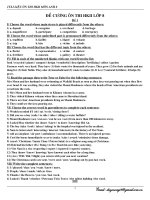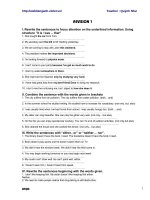On thi HKII Anh 11
Bạn đang xem bản rút gọn của tài liệu. Xem và tải ngay bản đầy đủ của tài liệu tại đây (126.89 KB, 5 trang )
<span class='text_page_counter'>(1)</span>REVISION I. RELATIVE CLAUSE: 1. Defining and Non- defining relative clause 2. Relative clauses with prepositions: Noun + preposition + pronoun( which/ whom) + relative clause 3. Relative clauses replaced by participles and to infinitive a. Present participle: We can use a present participle to replace a relative clause which has an active meaning. b. Past participle:We can use a past participle to replace a relative clause which has a passive meaning. c. To-infinitive(active)/ to be +past participle(passive):to-infinitive after an ordinary number (first, second…) after next, last, after, only… and after superlative adjectives. 4. Relative clauses and the omission of relative pronouns. a. Relative pronouns as subject: Ex: → The woman who/that lives next door is a doctor. → Where is the cheese which/that was in the fridge? The pronouns who / which / that can be the subject of a relative clause. b. Relative pronouns as object Ex: → The woman (who / whom / that ) wanted to see was away. → You can get back the tax (which / that) you’ve paid. The pronouns which / whom/who/ that can be the object of a relative clause. c. Omission of relative pronouns. We can leave out the pronouns when it is not the subject of the relative clause. Clauses without pronouns are very common in informal English. Ex: → The woman(that/who/whom) Gary met knows your sister. → The dress(that/which) Ann bought doesn’t fit her very well. Ex: → That man( who was )sitting next to Angela never said a word. Sometime we can use a participle without a relative pronoun II. CLEFT SENTENCES a. Subject focus: IT + IS/WAS + SUBJECT + THAT/WHO/WHOM/WHICH +…Used to emphasize agents of action b. Object focus: IT +IS/ WAS + OBJECT + THAT/WHICH/WHO/WHOM +… Used to emphasize objects of action c. Adverbial focus: IT + IS/WAS + ADVEB + THAT +… Used to emphasize adverbs of time and place of clause III. MODAL VERBS: CAN /COULD/ BE ABLE TO Ex1: My grandfather was very clever. He could speak five languages. Ex2: We were totally free. We could do whatever we wanted. Ex3: A girl fell into the river, but fortunately we were able to rescue her. Ex4: My father couldn’t swim. (=My father wasn’t able to swim.) IV. Tag questions Ex1: You are a student, aren’t you? Ex2: The film wasn’t very interesting, was it? Ex3:Mary does a lot of homework every day, doesn’t she? Ex4:John didn’t go to school yesterday, did he? Ex5: We have seen this film twice, haven’t we? Ex5: They can swim very fast, can’t they? NOTES: - I am… …, aren’t I ?/ …, am I not? Let’s… …, shall we? - Imperative: Do…/Don’t do……, will you? Invitation: …, Won’t you? Ex: Do sit down, won’t you? - Afirmative imperative: …, can/ can’t you/ could you? - There … …, ….there? Ex:There are only twenty-eight days in February, aren’t there? - It’s raining now, isn’t it? It isn’t raining now, is it? - Nothing/It… …, it? - Anyone/nobody/no one/ somebody/ someone/ everybody/everyone … …, they? Answers for tag questions - YES có nghĩa câu khẳng định là đúng, và NO có nghĩa câu phủ định là đúng Ex: Laire is married, isn’t she? Yes, she has just married.(vâng cô ấy vừa mới kết hôn) No, of course, she isn’t(không dĩ nhiên cô ấy chưa kết hôn) Ex: Andrew hasn’t got many friends. Yes.(không phải)= he has a lot of friends No.(Vâng) = he hasn’t got many.
<span class='text_page_counter'>(2)</span> friends Nếu ta lên giọng ở phần đuôi câu hỏi, thì đây là câu hỏi thật sự. Phần đuôi là khẳng định được dùng để hỏi điều gì đó, hoặc yêu cầu ai làm điều gì đó. Nếu xuống giọng ở phần đuôi câu hỏi nghĩa là bạn không thật sự đặt câu hỏi mà bạn chỉ muons người nghe đồng ý với bạn V. PASSIVE Ex1: It is said that this house was built 100 years ago. This house is said to have been built 100 years ago People say that this house was built 100 years ago Ex2: It is believed that he is poor He is believed to be poor They believe that he is poor S1 + V1 + that+S2+V2+… IT + be+ V1(3/Ved) +that+S2 +V2+… S2 +be + V1(3/Ved) + V2(TO_INFINITIVE)+ … the same tense as the tense in V1 (TO HAVE + V3/ed) +… action in V2 happening before action in V1 say, believe, suppose, think ,know, consider, expect, report, allege, feel, find, pressure, understand, estimate, claim, acknowledge, assume, … Notes: -If the verbs of the main clause and the subordinate clause are same tenses, use To-inf. -If the verbs of the main clause and the subordinate clause are different tenses (for example,M.C in present and S.C in past or perfect tenses), use To have + PP A. Transformation sentences 1. It is thought that there are too many obstacles to peace. There are 2. Please do not smoke in this area of the restaurant. Customers are 3. A new film has not often before produced such positive reviews. RareIy has . I. Write these sentence in another way, beginning as shown. 1. People know that he is armed. He 2. It is believed that the man was killed by terrorists. The man 3. People think that the company is planning a new advertising campaign. The company 4. It was reported that the President had suffered a heart attack. The President 5. It is alleged that the man was driving at 110 miles an hour. The man 6. People know that the expedition reached the South Pole in May. The expedition 7. It is said that there is a secret tunnel between them. There 8. People consider that she was the best singer that Australia has ever produced. She 9. It is expected that the weather will be good tomorrow. The weather 10. A lot of people believe that the Prime Minister and his wife have separated. The Prime Minister and his wife 11. It is reported that the building has been badly damaged by the fire. The building 12. People have acknowledged that underfunding, contributed to the problem. Underfunding 13. People believe that he has special knowledge which may be useful to the police. He.
<span class='text_page_counter'>(3)</span> 14. Journalists suppose that the footballer is earning ten million pounds a year. The footballer 15. It is reported that the damage is extensive. The damage 1. They presented Maria Svensson with the award last night. 2. People were watching the game outside the stadium on a huge screen. 3. The south coast continues to attract holidaymakers. 4. Somebody has described Keith Jones as the world's greatest guitarist. 5. Robert always hated other children teasing him. 6. 7. Somebody should have offered Marry a drink when she arrived. 8. Kay's questions began to irritate Malcolm. 9. You have to see it to believe it. 10. People are blaming climate change for the recent flooding. 11. Why did no one inform me of the change of the plan? 12. Everybody believed that the plan would fail. 13. We have discovered that a mechanical fault caused the problem. II. Complete the second sentence so that it has a similar tneaning to the first one; 1. The police think the burglar got in through the bathroom window. The burglar 2. She was sorry that she hadn't applied for the job in the library. She regretted 3. People used to think that the earth was flat. It 4. His mother was the most warm-hearted person I've ever known. I've 5. People say that the driver was listening to his walkman at the time of the crash. The driver 6. Thanks to the improvement in export s3Ies, the company has had a successful year. Without 7. I'm sorry I didn't go to your birthday party last night. I wish 8. People believe that the Prime Minister will resign tomorrow. The Prime Minister 9. They are going to repair our car next week. We 10. Although it was raining heavily, none of the guests came late. In spite B. Complete each sentence, using relative pronouns: 1. Mrs. Brown,……………….is 45, as four children. 2. This is the boy ……………studied with me in high school. 3. Mary said something …………….I couldn’t hear clearly. 4. Sydney,……………….I live, is a very beautiful place. 5. I don’t know the name of the woman ……………….I met yesterday at the station..
<span class='text_page_counter'>(4)</span> 6. That’s the man …………..Nelly gave the money to. 7. Is this the ring…………..you were looking for? 8. An orphan is a child ………….parents are dead. 9. Colin told me about his new job,………….he’s enjoying very much. 10. This morning I met somebody……………I hadn’t seen for ages. C. Join the sentence, using relative pronouns: 1. I met Tom’s mother. She works at the university. I met……………………………………………………………………………………. 2. The movie is very interesting. We are talking about it. The movie……………………………………………………………………………….. 3. I saw several houses. They were quite unsuitable. I saw …………………………………………………………………………………. 4. Her many friends gave her encouragement. I like to be considered among them. Her many friends……………………………………………………………………… 5. We are moving to Manchester. Manchester is in the north-west. We…………………………………………………………………………………….. Reduce relative clauses in the following sentences: 1. Be sure to follow the instructions that are given at the top of the page. @.................................................................................................................................................................................... 2.Students who arrive late will not be permitted to enter the classroom. @.................................................................................................................................................................................... 3. John, who was taken by surprise, hardly knew what to say. @.................................................................................................................................................................................... 4. The people who are waiting for the bus in the rain are getting wet. @.................................................................................................................................................................................... 5. We drove along the road that was still flooded after the heavy rain. @.................................................................................................................................................................................... Choose the best answer: 1. My bother Chan is someone…………………..about sports. A. to whom I always enjoy talking B. I always enjoy talking to him C. with who I always enjoy talking D. whom I always enjoy talking to him. 2. This is the book. He’s almost proud of it. A. This is the book which he’s almost proud of. B. This is the book which he’s almost proud. C. This is the book of which he’s almost proud. D. A & C are correct. 3. She gave us lots of suggestions……….we must think. A. about that B. about which C. that D. which 4. The historical facts………….this document bases are very worth considering. A. about which B. for which C. at which D. on which 5. He is the actor about …………. I often tell you. A. that B. who C. whom D. him 6. The song …………. I listened last weekend was boring. A. to that B. to which C. for what D. for which 7. That’s the girl to …………. my brother got engaged. A. which B. who C. whom D. her 8. I don’t know the reason …………. she hasn’t talked to me recently. A. on which B. for which C. of which D. about which 9. The little girl …………. I borrowed this pen has gone. A. whose B. from who C. from that D. from whom 10. The speech …………. we listened last night was information. A. to which B. which to C. to that D. that 11. The boy to …………. I lent my money is poor. A. that B. who C. whom D. B and C are correct The knife …………. we cut bread is very sharp..
<span class='text_page_counter'>(5)</span>
<span class='text_page_counter'>(6)</span>









